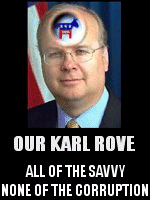Democrats,
There are a lot of issues currently swirling in the national debate, and the media and Republicans are going to hold the Democratic party (i.e., you) accountable for having stances on every issue -- inconvenient or otherwise. If the Democratic party plans on getting back into power this decade, you're going to have to lead, which means having positions on everything.
However, just having stances on the issues isn't good enough.
[oh, and using the adjective "real" to describe your version of policy is, frankly, not effective]
The entire party desperately needs an organizing principle which expresses itself as a party slogan as well as a framework from which to address every single issue on the table. An organizing principle that is consistently used to frame up positions reinforces itself and reinforces the party brand. A single organizing principle will seep into the public consciousness like "compassionate conservative" did in 1999/2000. An effective, well-utilized organizing principle will give you the flexibility to speak briefly in sound-bite mode as well as in-depth about any issue on the table.
After much thought and discussion, Your Karl Rove has developed the Democratic Organizing Principle for 2006:
Striking the Right Balance
Breaking this down, there are some clear advantages to adopting this principle:
"Striking" evokes the feeling of aggression and action. The Democratic Party brand is sorely lacking in these attributes thanks in part to the machismo and rhetoric of the Bush administration. Because America is at war now, being aggressive and action-oriented are required traits of the Democratic brand. Plus, it doesn't sound forced, as this word is an integral part of said phrase, which most everyone is familiar and comfortable with.
"Right" implies a values-based determination, and more importantly, maps to each person's individual idea of what is "right." Getting the individual's values engaged in the conversation makes them a participant, and participants are always more engaged than just consumers of rhetoric.
"Balance" ties into some fundamental American values that resonate with large swaths of voters. Phrases like "the balance of powers," "checks and balances," and "a balanced budget" are positive phrases that will be freely associated with the Democratic brand when this phrase is deployed.
Taken together, these two words not-so-subtly imply that the Republicans do not represent the right balance. The implication is that Republicans represent a party out of balance, and out of sync with core American values. The power here is that your organizing principle implicitly puts Republicans on the defensive without you needing to explicitly attack and appear partisan.
Built-in Flexibility: Nationally, this principle can reinforce the party brand of prudence, insight, and responsibility. Locally, this principle is flexible enough to be used in each individual district, no matter the local political landscape. For instance, striking the right balance just might vary between Mississippi and, say, New Hampshire. This built-in flexibility provides each politician in the field the ability to tweak the balance to effectively represent their district and/or state. Meanwhile, the aggregate power of every politician saying the same phrase will help reinforce the national brand, which in turn will further support local races. It's called a positive feedback loop, and it's high-time that the Democratic Party benefited from one of these, don't you think?
This organizing principle can be expressed in many different ways to solve many different political challenges. Here are just a few examples of its potential application:
The 2006 party slogan - Democrats, Striking the Right Balance for America
For sound bites on policies: Democrats represent striking the right balance on...
- individual privacy and collecting intelligence
- indefinite war and immediate withdrawal
- tax relief and the national debt
- immigration and naturalization
For a values debate: Democrats represent striking the right balance on...
- individual freedom and federal laws
- religious freedom and federal laws
For a national campaign metaphor:
"Democrats represent ushering the country back to the right balance in Washington. For too long, there has been only one party in power, clearly with no ability to keep itself in check. This has resulted in a single-party imbalance, with the unfortunate consequences of a never-ending war, higher gas prices, loss of individual privacy, corruption, scandals, torture, and Bin Ladin still on the loose. To strike the right balance, which will lead us to the best solutions, we need to have Democrats in power to hold this administration accountable. This means voting Democrats into power in the U.S. Congress in 2006."
With these examples, you can start to see how this organizing principle can be broadly applied to an almost infinite set of political challenges.
Of course, for specific races, these points will fall flat unless the deeper meaning of what "balance" means is communicated -- folks can't just say "I believe in striking the right balance between privacy and collecting intelligence" without having specifics around what this means to them. But, whatever details local politicians decide to explain after the organizing principle is set, these details will naturally be heard in the context of balance. You will be conditioning the voters before you tell your story.
After five years of imbalance by design after 9/11, the pulse of the nation is telling us that we're ready to shift back into an era of balance, competence, and a renewed interest in working toward a stronger whole, instead of a weaker divide.
